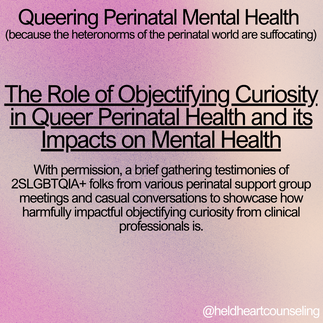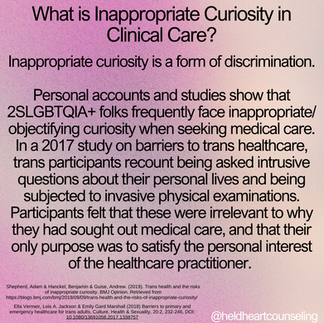The Role of Objectifying Curiosity in Queer Perinatal Health and its Impacts on Mental Health
- Laura V.
- Aug 7, 2023
- 4 min read
For the social media version of this, see the Instagram post. Black text is written on an ombre style background depicting different shades of the color pink, including lighter and darker pinks. The text reads as follows:
Queering Perinatal Mental Health
(because the heteronorms of the perinatal world are suffocating).
With permission, a brief gathering testimonies of 2SLGBTQIA+ folks from various perinatal support group meetings and casual conversations to showcase how harmfully impactful objectifying curiosity from clinical professionals is.
What is Inappropriate Curiosity in Clinical Care?
Inappropriate curiosity is a form of discrimination.
Personal accounts and studies show that 2SLGBTQIA+ folks frequently face inappropriate/ objectifying curiosity when seeking medical care. In a 2017 study on barriers to trans healthcare, trans participants recount being asked intrusive questions about their personal lives and being subjected to invasive physical examinations. Participants felt that these were irrelevant to why they had sought out medical care, and that their only purpose was to satisfy the personal interest of the healthcare practitioner.
Perinatal Care & Inappropriate Curiosity
Findings from studies suggest that there is a ‘discrimination continuum’ with experiences of discrimination ranging from subtle to overt.
Subtle discrimination in healthcare can be as damaging as overt because the patient may have to figure out whether they are safe - and if not, what to do in a time where they may have few options.
During the perinatal period specifically, perceptions of reproduction, sex and gender may be explicitly linked. Biased and unskilled providers can use this opportunity to nonconsensually and subtly harass patients. As OB care during the perinatal period may uphold a lot gendered practices, the risk for 2SLGBTQIA+ folks starting families in facing discrimination is high.
Their Own Words
"The OB hospital nurses, who rotated during my endless 34 hour labor, asked me and my husband the same questions even if the information was already in my charts. They asked about my top surgery and if my partner was the father so many times, even when I had told my OB, who was great, that I had no interest in chestfeeding and my OB wrote in the notes what was and wasn't important clinically for the nurses. This made me feel like I was there for their gossip. I am always aware of this kind of feeling from people but in the case of labor, I did not have the energy to fight it off."
Their Own Words Cont...
"It wasn't until we found a queer homebirth midwife did we feel like this was going to be a normal birth. Everything had been hard and took so long. Once we found our midwife, we finally felt like we can get started planning for labor. We interviewed another midwife, who even said she had experience with people 'like us' but then asked my wife so many personal questions about how she would cope not being related to the baby. This was fucking awful."
Their Own Words Cont...
"When we were looking for surrogates and agencies, I constantly felt like I was under a microscope. This was triggering and brought me right back to when I was first transitioning. Like I didn't deserve to exist or have a family because of who I am. I was asked if I wanted 'biological kids' in every possible way except in the ways we needed, which would have been supportive, open and like we were as entitled as anyone to have a family. It isn't always something said, it is also the unsaid too."
Their Own Words Cont...
"As a single, lesbian mom by choice, I did get a lot of questions about my lifestyle from so many people. The ones that stung hard were from my former therapist. I started working with her when I had signs of anxiety before birth. She asked me about the IUI and sperm bank process. When I told her that the sperm was from a friend who did not want to parent, she kept asking questions. They weren't about my feelings but the mechanics and the signed agreements between me and my friend. After this, I realized this wasn't about me."
Their Own Words Cont...
"After I was pregnant, my partner and I started planning our birth. I needed to work with a higher risk doctor because I have a blood clotting condition. In the office, the new high risk doctor assumed I wanted a C-Section because I am trans. I didn't. She asked me too many questions about why I would want to give birth 'that other way'. She expected me to educate her and feel fine about her discrimination in offering me major surgery that I did not need or want. "
Mental Health Impacts
Being reduced to a set of to-be-examined body parts in the eyes of those who are your professional caretakers during an already vulnerable time has a dehumanizing effect on the patient. Further, these are likely to be stacking experiences for the patient who may have experienced this before.
This can lead to a state of anxious vigilance, a lack of sharing important medical information before or after birth, disassociation during appointments, elevated risk of PMADs, elevated risk of birth trauma, risk of dyadic feeding rupture, perinatal complications related to stress, and it has an overall cumulative negative effect on queer people’s mental health.
Moving Forward
Lucie Fielding, a brilliant educator, therapist & community member, who frequently discusses this concept, has written this regarding mental health providers (though it is equally applicable to perinatal providers like doulas, OBs, and etc.):
"When we deploy curiosity in these ways in our work with clients, we bring this painful and ignominious history into the consulting room with us and we risk operationalizing our curiosity to become unwitting instruments of social control."
Additionally, they offer some ideas for healthcare providers to consider (paraphrased for space):
Question your desire to know. When you feel curious ask yourself, “Who is this for?”
Re-envision informed consent as something that is renewed and renegotiated throughout the client visit.
Treat the client in front of you. Don’t allow a single facet of a client’s identity constellation to become the focus of your curiosity.
A Few Quick Links to Lucie's Work
The Shadow Side of Therapist Curiosity (the above is taken from this great article)
Podcast; Unethical Gender Curiosity
























Comments